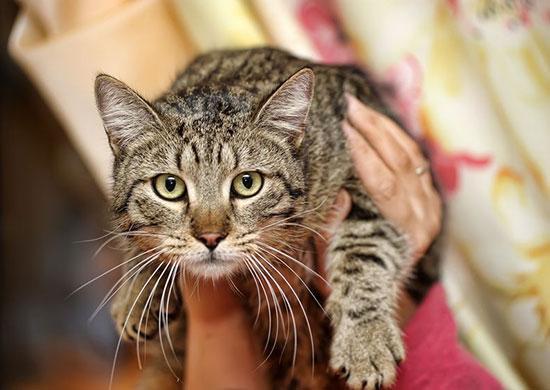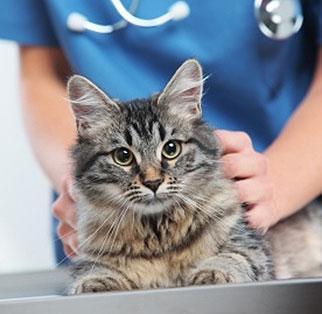This content is archived from the Feline Nutrition Foundation
How Raw Food for Cats Affects Blood Test Results
- Updated: Wednesday, May 01, 2019 05:40 PM
- Published: Saturday, September 27, 2014 06:05 PM
- Written by Lyn Thomson, BVSc DipHom
 My cat used to be fed a dry kibble diet. I've been feeding her a raw cat food diet for the past six months and I'm very happy with the results. She is going in for her annual checkup soon. Will her new diet cause changes in her blood work?
My cat used to be fed a dry kibble diet. I've been feeding her a raw cat food diet for the past six months and I'm very happy with the results. She is going in for her annual checkup soon. Will her new diet cause changes in her blood work?
Yes, there can be slight changes in some of the blood work values because of the switch to a high-protein, very low or non-carbohydrate diet. People who feed raw diets – and this applies to cats and dogs – sometimes find that their pet's blood urea nitrogen or blood creatinine are slightly elevated. Both are used to assess urinary tract function. When the mechanism of production of these compounds is examined, this elevation makes sense. A 2003 study compared the blood values for 256 healthy, adult dogs of various ages and breeds. The dogs were divided into two groups: one group was kibble-fed and the other had been raw-fed for at least nine months.¹ There was no significant difference in results between the two groups, with the exception of haematocrit, BUN and creatinine. These parameters were, on average, higher in the raw-fed group than for the kibble-fed group. They were all still within the acceptable normal range for a healthy dog.
 Haematocrit refers to the amount of red blood cells found in the total blood volume. Animals that are fed raw meat diets receive more highly digestible animal protein – as opposed to plant proteins and protein from animal by-products in kibble – and therefore more highly available sources of iron and B vitamins, which are requisite for red blood cell growth. A slightly elevated haematocrit value is not surprising under these conditions.
Haematocrit refers to the amount of red blood cells found in the total blood volume. Animals that are fed raw meat diets receive more highly digestible animal protein – as opposed to plant proteins and protein from animal by-products in kibble – and therefore more highly available sources of iron and B vitamins, which are requisite for red blood cell growth. A slightly elevated haematocrit value is not surprising under these conditions.
BUN is produced in the liver from protein digestion and is filtered from the blood by the kidneys. BUN will be too low on a low-protein diet, with liver disease or steroid use. BUN will be too high when protein digestion or kidney function is compromised. Raw-fed animals have a complete range of highly digestible, animal-based amino acids available to them, so it is not unexpected that more BUN is produced. Human BUN also increases on a high-protein diet.
Creatinine is a muscle break-down product and is filtered from the blood by the kidneys. It will be elevated when there is kidney dysfunction, dehydration, gastrointestinal bleeding and due to dietary factors. Normal kidneys should produce consistent creatinine over time.
The slightly higher values in the raw-fed group are not surprising given that they relate to protein metabolism. Cats and dogs on a carefully planned, balanced raw diet receive high-quality, complete protein from animal sources that is more easily utilised than inferior protein sources in kibble.
Additional Reading
Answers: Plant vs. Meat – The Protein Feud for Cat Food
Answers: Why Did My Cat's Fur Get So Silky?
It is important to keep these potential blood work differences in mind when you change what you feed your cat. Be sure to let your veterinarian know about the new raw cat food diet. Since higher than expected values could be a cause for concern about your cat's kidney function, the diet will have to be taken into account. What is normal for your cat will likely have to be revised from previous tests done when she was fed dry kibble.
Note: Feline Nutrition provides feline health and nutrition information as a public service. Diagnosis and treatment of specific conditions should always be in consultation with your own veterinarian. Feline Nutrition disclaims all warranties and liability related to the veterinary advice and information provided on this site.
Dr. Lyn Thomson trained at the University of Bristol in England and is studying with the Australasian College of Nutritional and Environmental Medicine. A dedicated and experienced advocate of bio-appropriate nutrition, Lyn practices in Auckland, New Zealand. HerRaw Essentials stores have grown to seven retail locations, providing a variety of raw diet products for cats and dogs.
1. SG Wynn, J Bartges and WJ Dodds, "Raw Meaty Bones-based Diets May Cause Prerenal Azotemia in Normal Dogs," AAVN Nutrition Research Symposium, June 2003.




